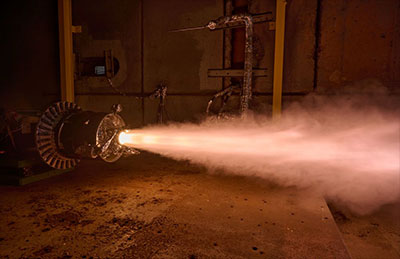Northrop Grumman Completes Key Test For Exoplanetary Ascent PropulsionNorthrop Grumman has achieved a significant milestone in space exploration technology with a successful testing of an advanced second-stage motor for ascent propulsion from another planet. This crucial test ensures that when the first rocket launches from another planet such as Mars, it would have the capability to launch samples from the planet's surface into its orbit for a precise rendezvous in space with an orbiter.

Above: Northrop Grumman's DM-NEXT solid rocket motor test. (Northrop Grumman)
The recent motor test was conducted at Northrop Grumman's Elkton, MD campus. The Elkton facility designs and manufactures solid and liquid propulsion systems and controls for some of the nation's most complex defense and space systems. Elkton is headquarters for Northrop Grumman's propulsion systems & controls business unit, the company's premier advanced propulsion provider for hypersonic, missile defense and space systems, and strategic programs.
"With this third successful full-scale static test, we have demonstrated a near-flight ready design using proven space materials and propellants," said Jeff Bemis, program manager of the Mars Ascent Propulsion System (MAPS) program at Northrop Grumman. "We've been to Mars before using materials and propellants such as these. Our materials and propellants have a legacy of proven reliability and are well-suited for the extreme conditions of space and planetary protection requirements." A dozen Northrop Grumman solid rocket motors have been successfully used for prior Mars missions.
The recent motor test was conducted to validate a change to the propellant, aimed at increasing overall vehicle performance. This propellant is a longstanding workhorse in Northrop Grumman's catalog of STAR™ motors, used in numerous near-Earth and deep space missions. The test confirms the readiness of ascent propulsion to support future missions to other planets regardless of the chosen landing technology.
"This test exemplifies Northrop Grumman's ability to rapidly transition from design to hardware build and testing, while adhering to timelines and budgets," said Jonathan Katz, MAPS Chief Engineer, Northrop Grumman. "The team will continue comprehensive analysis and testing to ensure the flight motors meet future mission requirements, including launch and landing loads specific to planets like Mars, as well as extreme thermal conditions. Northrop Grumman remains at the forefront of advancing human exploration of Mars."












